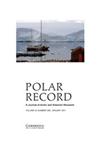Changing Svalbard: Tracing interrelated socio-economic and environmental change in remote Arctic settlements
IF 1.6
4区 环境科学与生态学
Q3 ECOLOGY
引用次数: 7
Abstract
Abstract The archipelago of Svalbard is a good example of an Arctic locale undergoing rapid changes on multiple levels. This contribution is a joint effort of three anthropologists with up-to-date ethnographic data from Svalbard (mostly Longyearbyen and Barentsburg) to frame and interpret interconnected changes. The processes impacting Svalbard are related to issues such as geopolitical interests, and increasing pressure by the Norwegian government to exercise presence and control over the territory. Our interpretations are based on a bottom-up approach, drawing on experiences living in the field. We identify three great ruptures in recent years – the avalanche of 2015, the gradual phasing out of mining enterprises and the COVID-19 pandemic – and show how they further impact, accelerate or highlight preexisting vulnerabilities in terms of socio-economic development, and environmental and climate change. We discuss the shift from coal mining to the industries of tourism, education, and research and development, and the resulting changed social and demographic structure of the settlements. Another facet is the complexity of environmental drivers of change and how they relate to the socio-economic ones. This article serves as an introductory text to the collection of articles published in Polar Record in 2021/2022 with the overarching theme “changing Svalbard”. Issues discussed range from socio-economic change and its implications for local populations including identity of place, through tourism (value creation, mediation, human–environment relations, environmental dilemmas, balancing contradictory trends), to security and risk perception, and environmental and climate change issues.不断变化的斯瓦尔巴群岛:追踪北极偏远定居点相互关联的社会经济和环境变化
摘要斯瓦尔巴群岛是北极地区在多个层面上发生快速变化的一个很好的例子。这一贡献是三位人类学家的共同努力,他们利用斯瓦尔巴群岛(主要是朗伊尔城和巴伦茨堡)的最新民族志数据来构建和解释相互关联的变化。影响斯瓦尔巴群岛的进程与地缘政治利益以及挪威政府要求对该领土行使存在和控制权的压力等问题有关。我们的解释是基于自下而上的方法,借鉴了该领域的经验。我们确定了近年来的三大断裂——2015年的雪崩、采矿企业的逐步淘汰和新冠肺炎大流行——并展示了它们如何进一步影响、加速或突出社会经济发展、环境和气候变化方面预先存在的脆弱性。我们讨论了从煤矿开采向旅游业、教育业和研发业的转变,以及由此产生的定居点社会和人口结构的变化。另一个方面是变化的环境驱动因素的复杂性,以及它们与社会经济驱动因素的关系。这篇文章是2021/2022年发表在《极地记录》上的文章集的介绍性文本,其总体主题是“改变斯瓦尔巴群岛”。讨论的问题包括社会经济变化及其对当地人口的影响,包括地方认同,通过旅游业(价值创造、调解、人与环境关系、环境困境、平衡矛盾趋势),到安全和风险感知,以及环境和气候变化问题。
本文章由计算机程序翻译,如有差异,请以英文原文为准。
求助全文
约1分钟内获得全文
求助全文
来源期刊

Polar Record
环境科学-环境科学
CiteScore
1.40
自引率
25.00%
发文量
26
审稿时长
>36 weeks
期刊介绍:
Polar Record is an international, peer-reviewed scholarly periodical publishing results from a wide range of polar research areas. The journal covers original primary research papers in the humanities, social sciences, physical sciences, life sciences, and polar technology, as well as papers concerning current political, economic, legal, and environmental issues in the Arctic or Antarctic. Polar Record endeavours to provide rapid publication, normally within nine months of initial submission.
 求助内容:
求助内容: 应助结果提醒方式:
应助结果提醒方式:


